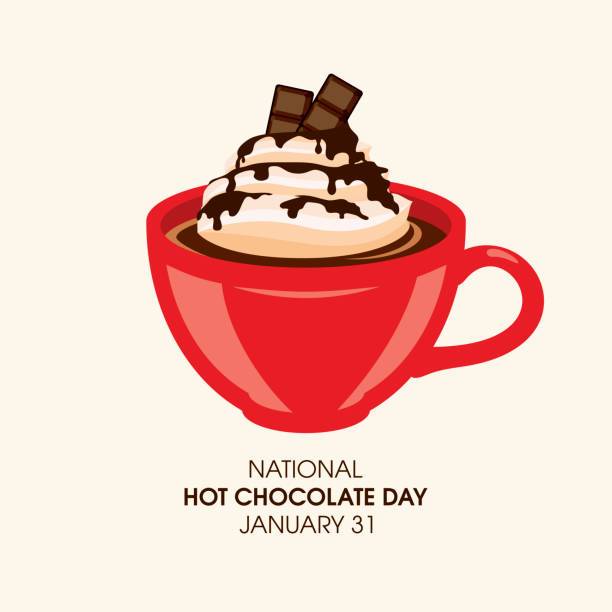National Hot Chocolate Day: A Celebration of Coziness and Comfort
What is the best way to warm up on a cold winter day? Some might say a cozy blanket, a good book, or a crackling fire. But for many people, the answer is a cup of hot chocolate. Hot chocolate is a delicious drink made from cocoa, milk, and sugar, often topped with whipped cream, marshmallows, or spices. It is a popular beverage around the world, especially during the winter season. But did you know that there is a special day dedicated to celebrating this drink? That’s right, January 31st is National Hot Chocolate Day in the United States. This day is a chance to enjoy and appreciate the history, culture, and benefits of hot chocolate.
History of Hot Chocolate
Hot chocolate has a long and rich history that dates back to ancient times. The first known people to drink hot chocolate were the Maya and the Aztecs, who lived in Central and South America. They made a bitter drink from roasted cacao beans, water, and spices, such as chili and vanilla. They called it xocolatl, which means “bitter water” in their language. They believed that cacao was a gift from the gods and that drinking it gave them strength and wisdom.
The Spanish explorers who came to the Americas in the 16th century were introduced to this drink and brought it back to Europe. They added sugar and milk to make it sweeter and creamier, and soon it became a fashionable drink among the nobility and the wealthy. Hot chocolate was also enjoyed by the clergy and the intellectuals, who used it as a stimulant and a medicine. In the 17th and 18th centuries, hot chocolate houses were popular places for socializing and discussing politics, art, and literature.
In the 19th century, hot chocolate became more accessible and affordable to the masses, thanks to the invention of the cocoa press and the powdered cocoa. These innovations made it easier to produce and transport cocoa, and to make hot chocolate at home. Hot chocolate also became a part of the military rations, as it provided energy and morale to the soldiers. During World War II, the US Army distributed instant hot chocolate mix to the troops, and the Red Cross served hot chocolate to the wounded and the refugees.
Culture of Hot Chocolate
Hot chocolate is not only a drink, but also a part of the culture and tradition of many countries. Different regions have their own variations and preferences for making and serving hot chocolate. For example, in France, hot chocolate is usually thick and rich, made with dark chocolate and cream. It is often served in small cups with a croissant or a pain au chocolat. In Mexico, hot chocolate is flavored with cinnamon, vanilla, and sometimes cornmeal. It is frothed with a wooden whisk called a molinillo and served with churros or pan dulce. In Italy, hot chocolate is very dense and pudding-like, almost like a dessert. It is usually topped with whipped cream and enjoyed with a spoon. In Switzerland, hot chocolate is made with milk chocolate and sometimes mixed with coffee. It is served in large mugs with whipped cream and chocolate shavings.
Hot chocolate is also associated with many festivals and holidays, such as Christmas, Valentine’s Day, and Halloween. It is a common drink to share with family and friends, or to give as a gift. Many people also have their own rituals and memories related to hot chocolate, such as making it with their grandparents, drinking it after playing in the snow, or curling up with it on a rainy day.
Benefits of Hot Chocolate
Hot chocolate is not only tasty, but also good for you. It has many health and psychological benefits that can improve your well-being. Here are some of them:
- Hot chocolate can boost your mood and reduce stress. Cocoa contains chemicals called phenylethylamine and anandamide, which stimulate the brain to produce endorphins and serotonin, the hormones that make you feel happy and relaxed. Hot chocolate can also trigger nostalgia and comfort, which can make you feel more positive and calm.
- Hot chocolate can improve your cognitive function and memory. Cocoa is rich in flavonoids, antioxidants that protect the brain cells from damage and inflammation. Flavonoids also enhance the blood flow to the brain, which can improve your attention, concentration, and learning. Studies have shown that drinking hot chocolate can improve the performance of elderly people on cognitive tests and prevent the decline of mental abilities.
- Hot chocolate can lower your blood pressure and cholesterol. Flavonoids can also relax the blood vessels and improve the circulation, which can lower the blood pressure and the risk of heart disease and stroke. Cocoa can also reduce the levels of LDL (bad) cholesterol and increase the levels of HDL (good) cholesterol, which can prevent the buildup of plaque in the arteries.
- Hot chocolate can strengthen your immune system and fight infections. Cocoa contains polyphenols, another type of antioxidants that can boost the immune system and prevent the growth of harmful bacteria and viruses. Polyphenols can also modulate the inflammation and the immune response, which can help the body heal faster and prevent chronic diseases.
On National Hot Chocolate Day, let us appreciate and honor this wonderful beverage that has been with us for centuries. Let us make ourselves a cup of hot chocolate, and savor its flavor, aroma, and warmth. Let us share it with our loved ones, and toast to its goodness. Let us make this day a cozy and comfortable one. Happy National Hot Chocolate Day!







